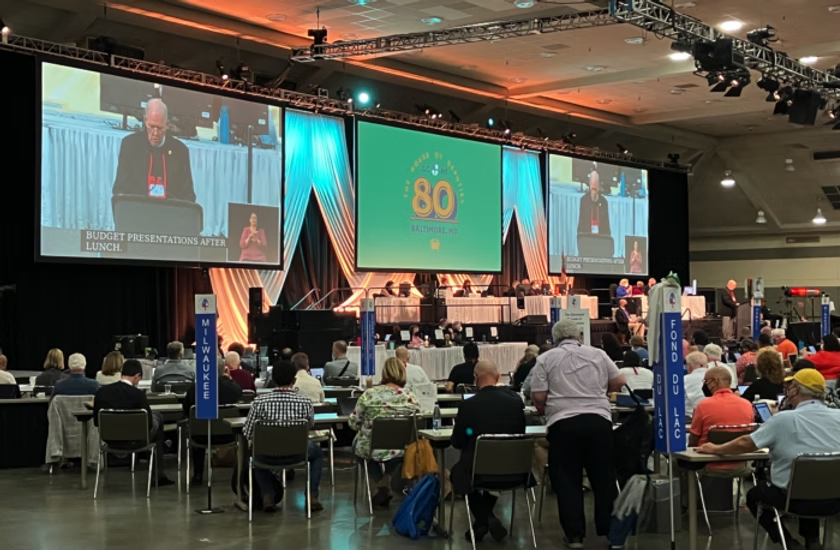

Trans Episcopal

Trans Episcopal

Trans Episcopal

Trans Episcopal

Trans Episcopal

Trans Episcopal


THE CONSULTATION
The consortium of progressive organizations in the Episcopal Church
Haven’t heard of us? That’s understandable. We’re an organization of organizations. We don’t have individual members. We bring together the progressive groups in The Episcopal Church. The Consultation doesn’t set priorities for its member organizations but we look for ways to help each other reach our goals. Our focus is on the General Convention every three years. We’ve been doing this since 1985 and most of the remarkable progress our church has made since then has been a result of the mutual assistance and sharing of perspectives that the Consultation has encouraged. The challenges remain and may be even more daunting. The Episcopal Church needs the Consultation. We are more effective together.

A Call to the 81st General Convention
Two years ago, the 80th General Convention, despite being limited by the global pandemic, set important benchmarks for who we are as Church and how we want to be Church together. Convention passed the resolutions put forward by the Presiding Officers’ Working Group on Racial Reconciliation and we began to tell the truth about our Church’s complicity in genocide against Indigenous peoples, and we continued the work of naming and repenting our Church’s active participation in the enslavement of millions. From our prayerbook to our pocketbooks, we committed to becoming Beloved Community.
Convention established and funded a new position: a churchwide staff officer for gender justice. Convention also affirmed (but did not fund) the need to develop multilingual, multicultural formation and training materials to welcome and support communities of diverse genders, including trans, non-binary, and Two Spirit people.
Convention passed public policy resolutions affirming our support for care workers, for ending educational debt, for supporting women’s health care rights and trans youth, and lamenting the rise of ethnic and religious nationalisms around the world—and these resolutions have been carried into the world by our Episcopal Public Policy Network, Committee on Corporate Social Responsibility, Episcopal Migration Ministries, and countless local churches and communities.
Two short years later, our world is still facing profound and interlocking crises of climate change and deterioration of democratic norms that threaten the well-being of all humanity, even as the power of our own church as an institution continues to diminish.
Where will the Christian Church stand in the breach? What does it mean to be faithful Christian community in anxious times such as these?
Principles of Reconciliation for this Convention:
The Consultation calls upon the 81st General Convention of the Episcopal Church meeting in Louisville, Kentucky, to focus on these principles of reconciliation:
-
Becoming Beloved Community – working intentionally for racial, gender, and economic justice and healing within the Church and in our world, recommitting ourselves to truth-telling and to ending systems of exclusion, exploitation, and interlocking forms of inequality and oppression.
-
Being peacemakers – working locally and globally for initiatives and public policies to end war and prevent gun violence, to rebuild war-torn communities, to care for the Earth and the people who are on the front lines of environmental damage and climate change, and to promote systems of governance that allow for self-determination, human rights, and democracy for all peoples regardless of race, ethnicity, religion, gender, or sexuality.
-
Sharing our many gifts with each other and others beyond our churches, especially across lines of wealth and poverty, privilege and less power, to help build the church of the future, and investing in younger generations and the future church that will be facing challenges posed by climate change and breakdown of community; sharing our abundance with our communities and the world, in a spirit of love that remembers that our riches do not belong to us, but that all things come from God.
Above all, first and last:
-
Praying as we want to live and living as we pray – taking the time while at the Convention to pray together, to be in the room together, to break bread together, and to make our decisions and votes in a spirit of remembering that “our common life depends upon each other’s toil;” always remembering the love of Jesus Christ whose arms stretched on the cross bear the weight of this world, even in these anxious and troubled times, and whose resurrection calls us to faithfulness and hope.
Un Llamado de La Consultación a la 81ª Convención General
Hace dos años, la 80.ª Convención General, a pesar de estar limitada por la pandemia mundial, estableció puntos de referencia importantes sobre quiénes somos como Iglesia y cómo queremos ser Iglesia juntos. La Convención aprobó las resoluciones presentadas por el Grupo de Trabajo de la Mesa Directiva sobre Reconciliación Racial y comenzamos a decir la verdad sobre la complicidad de nuestra Iglesia en el genocidio contra los pueblos indígenas, y continuamos el trabajo de nombrar y arrepentirnos de la participación activa de nuestra Iglesia en la esclavitud de millones. Desde nuestro libro de oraciones hasta nuestros bolsillos, estamos comprometidos a convertirnos en una Comunidad Amada.
La Convención estableció y financió un nuevo puesto: un funcionario de personal de toda la iglesia para la justicia de género. La Convención también afirmó (pero no financió) la necesidad de desarrollar materiales de formación y capacitación multilingües y multiculturales para dar la bienvenida y apoyar a comunidades de diversos géneros, incluidas las personas trans, no binarias y de Dos Espíritus.
La Convención aprobó resoluciones de políticas públicas que afirman nuestro apoyo a los trabajadores del cuidado, a poner fin a la deuda educativa, a apoyar los derechos de atención médica de las mujeres y de los jóvenes trans, y lamentando el aumento de los nacionalismos étnicos y religiosos en todo el mundo, y estas resoluciones han sido llevadas al mundo por nuestra Red Episcopal de Políticas Públicas, el Comité de Responsabilidad Social Corporativa, los Ministerios Episcopales de Migración e innumerables iglesias y comunidades locales.
Dos cortos años después, nuestro mundo todavía enfrenta crisis profundas e interrelacionadas de cambio climático y deterioro de las normas democráticas que amenazan el bienestar de toda la humanidad, incluso cuando el poder de nuestra propia iglesia como institución continúa disminuyendo.
¿Dónde estará la Iglesia cristiana en esa brecha? ¿Qué significa ser una comunidad cristiana fiel en tiempos de ansiedad como estos?
Principios de Reconciliación para esta Convención:
La Consultación pide a la 81ª Convención General de la Iglesia Episcopal reunida en Louisville, Kentucky, que se centre en estos principios de reconciliación:
-
Convertirnos en una Amada Comunidad: trabajar intencionalmente por la justicia y la curación racial, de género y económica dentro de la Iglesia y en nuestro mundo, comprometiéndonos nuevamente a decir la verdad y poner fin a los sistemas de exclusión, explotación y formas entrelazadas de desigualdad y opresión.
-
Ser pacificadores: trabajar a nivel local y global en iniciativas y políticas públicas para poner fin a la guerra y prevenir la violencia armada, reconstruir comunidades devastadas por la guerra, cuidar la Tierra y las personas que están en la primera línea del daño ambiental y el cambio climático, y promover sistemas de gobernanza que permitan la autodeterminación, los derechos humanos y la democracia para todos los pueblos independientemente de su raza, etnia, religión, género o sexualidad.
-
Compartir nuestros muchos dones entre nosotros y con otras personas más allá de nuestras iglesias, especialmente a través de líneas de riqueza y pobreza, privilegios y menos poder, para ayudar a construir la iglesia del futuro e invertir en las generaciones más jóvenes y en la iglesia futura que enfrentará desafíos que plantea el cambio climático y la descomposición de las comunidades—compartiendo nuestra abundancia con nuestras comunidades y el mundo, en un espíritu de amor que recuerda que nuestras riquezas no nos pertenecen, sino que todo proviene de Dios.
Sobre todo, primero y último:
-
Orar como queremos vivir y vivir mientras oramos – tomarnos el tiempo mientras estamos en la Convención para orar juntos, estar juntos en la sala, partir el pan juntos y tomar nuestras decisiones y votos con un espíritu de recordar que «¿Nuestra vida común depende del trabajo de cada uno» —recordando siempre el amor de Jesucristo cuyos brazos extendidos en la cruz soportan el peso de este mundo, incluso en estos tiempos angustiosos y turbulentos, y cuya resurrección nos llama a la fidelidad y a la esperanza.

CONTACT
THE
CONSULTATION
OUR ADDRESS
The Consultation
PO Box 583
Ocean Grove, NJ 07756-0583